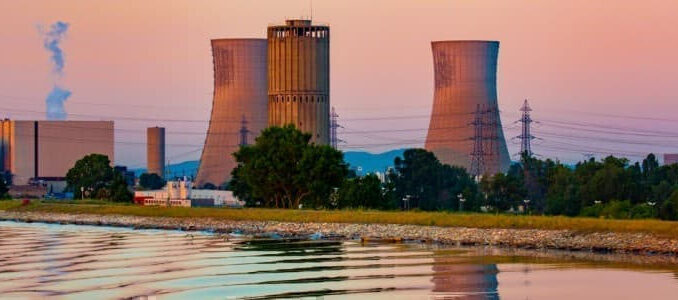
- The United States has ambitious plans for its nuclear power industry.
- Russia’s stranglehold on the uranium market threatens to delay progress in nextgen nuclear power projects.
- U.S. companies are scrambling to develop the domestic uranium supply chain needed to fuel nuclear power ambitions.The U.S. is doubling down on nuclear power generation as a means to reduce emissions and is supporting demonstration projects of advanced smaller nuclear reactors that promise to be more efficient and cost less to build than the current nuclear fleet.However, there is one major hurdle to the construction of most advanced reactors under development in the United States—the uranium type of fuel on which those reactors are designed to run is currently sold commercially by only one company in the world. And that company is a subsidiary of Russia’s ROSATOM, the Russian State Atomic Energy Corporation.
The federal government and U.S. companies developing advanced nuclear reactors—including Bill Gates’ TerraPower—recognize the urgent need to eliminate reliance on a Russian state corporation for nuclear fuel for America’s next-generation nuclear reactors.
The association Uranium Producers of America noted during a Senate committee hearing after the Russian invasion of Ukraine that “almost none of the fuel needed to power America’s nuclear fleet today comes from domestic producers, while U.S. nuclear utilities purchase nearly half of the of the uranium they consume from state-owned entities (SEO) in Russia, Kazakhstan, and Uzbekistan.”
“We estimate that there is more than $1 billion in annual U.S. dollar purchases of nuclear fuel flowing to ROSATOM,” said Scott Melbye, president of the association and Executive Vice President at Uranium Energy Corp.
ROSATOM is not under Western sanctions after the Russian invasion of Ukraine because of the Russian state firm’s importance in the supply chain of the global nuclear power industry. But the U.S. firms developing the next generation of more efficient, cheaper, and more environmentally friendly nuclear reactors don’t want to do business with Russia anymore.
Hence, the need for a commercially viable and stable domestic supply chain of the fuel for those advanced reactors—HALEU, or high assay low enriched uranium.
“If America wants to lead the global deployment of these innovative new reactors, establishing an assured domestic source of HALEU is essential,” says U.S. nuclear fuel supplier Centrus Energy, the only company in the U.S. currently licensed to produce HALEU.
The HALEU nuclear fuel component is uranium that has been enriched so that the concentration of the fissile isotope U-235 is between 5% and 20% of the mass of the fuel. This is higher than the 3-5% concentration of low-enriched uranium that fuels the existing fleet of reactors. It is still far below the 90% assay used to make weapons or power the U.S. Navy’s fleet of nuclear submarines and aircraft carriers. According to Centrus Energy, the higher concentration of the uranium isotope in HALEU means the fuel assemblies and reactors can be smaller, and reactors don’t need refueling as often, which is why many small modular reactor (SMR) and micro-reactor designs will run on HALEU. HALEU can also reduce the volume of waste generated.
“Production of HALEU is a critical mission and all efforts to increase its production are being evaluated,” a spokesperson for the U.S. Department of Energy (DOE) told Reuters.
Yet, the U.S. government faces the “chicken and egg” dilemma in HALEU supply, Matt Bowen, Research Scholar at the Center on Global Energy Policy at Columbia University SIPA, and Paul M. Dabbar, Distinguished Visiting Fellow at the same center, wrote in a paper in May this year/
“Existing enrichment companies, such as Urenco, Orano, GLE, and Centrus, could make HALEU, but these companies would likely be hesitant to invest too much in building HALEU infrastructure and completing NRC licensing without being confident there will in fact be a profitable market for the product,” they say.
“Early advanced reactor strategies relied on Russia’s established HALEU production facilities to provide the first core loads while domestic capabilities were developed,” Bill Gates’ TerraPower said after the Inflation Reduction Act was passed.
“As a result of the invasion in Ukraine, this is no longer a viable approach and the urgency to develop domestic advanced fuel infrastructure has been thrust to the forefront,” TerraPower says.
The Inflation Reduction Act allocates $700 million in federal funding to help jump-start domestic production of HALEU, which is expected to catalyze the creation of a domestic commercial HALEU market
“This higher enriched fuel is urgently needed to support the deployment of advanced reactors, including DOE’s two demonstration projects with TerraPower and X-energy,” DOE said in September.
According to TerraPower, “one more critical piece of the puzzle remains. In order for advanced nuclear development to stay on track we need a short-term solution, along with congressional support, until the domestic HALEU supply chain is fully operational.”
“With Russian uranium no longer viable, now is the time to seriously explore downblending highly enriched uranium (HEU) sources as a plausible way to garner the fuel needed for the initial cores of reactors being deployed this decade,” TerraPower said in August.



